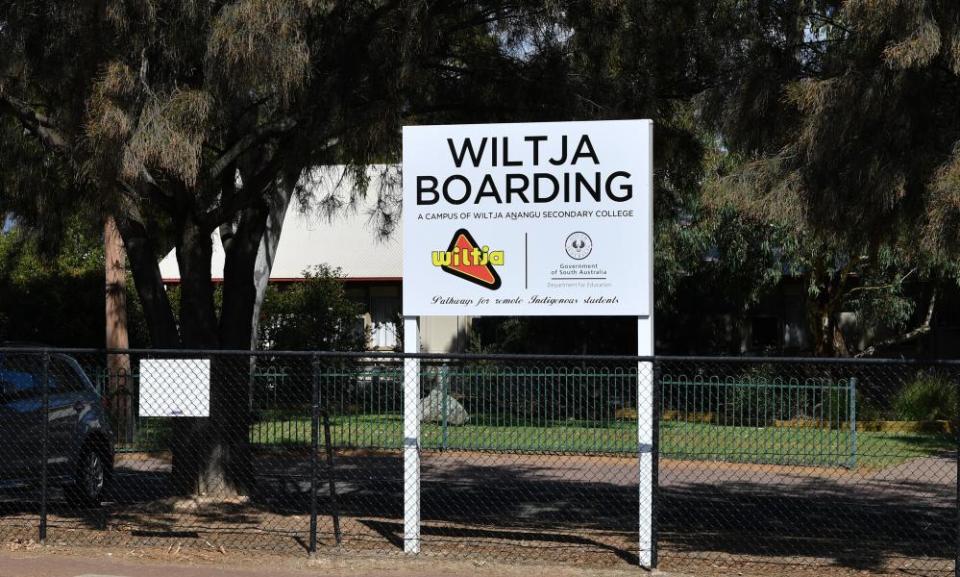Indigenous elders ask to be evacuated from remote communities over coronavirus fears

Calls are growing for governments to support the evacuation of Aboriginal elders from remote and regional communities as Covid-19 spreads.
Medical and cultural groups say governments must act before it’s too late, while doctors warn it’s a “very difficult decision” and the window in which to make it is closing fast. But the South Australian government has said it will not move people “at this time”.
The Anangu-Pitjantjatjara-Yankunytjatjara art centres (APYACC) have been lobbying for three weeks to have the SA government support a plan to transport a group of senior people from their remote communities into isolation at the Wiltja Anangu school in Adelaide.
APYACC says border closures aren’t working, with people still crossing in and out on remote roads, and elderly people are living in overcrowded housing alongside several generations of family.
“Social distancing is a luxury we do not have,” elders at one of the APYACC art centres wrote to the SA government this week.
Related: Frontline doctors prepare for ‘death and suffering’ when coronavirus hits Indigenous communities
“During the past week, our communities have seen an influx of estranged family members sent back from the cities as part of the government’s strategy of returning Aboriginal people to their communities,” the elders at Mimili art centre wrote.
“Already crowded houses are now beyond capacity as we try to accommodate the newcomers, many of whom have a recent history of substance abuse and associated challenges.
“Self-isolation and best practice hygiene are not an option in this environment.
“It feels like our people have been herded up and locked down in communities where facilities, housing and medical support are severely lacking.”
Prof Paul Torzillo is a leading respiratory and intensive care physician at Sydney’s RPA hospital, and medical director of Nganampa Health Council (NHC), which operates seven clinics in the APY region.
Torzillo says moving elders into Adelaide is a “difficult problem” but Nganampa would support it, if a number of “absolute preconditions” were met.
“They would be moving from what is currently a very low prevalence location, to a location where there is already community transmission,” he said. “However, you have to balance against that the fact that once there is community transmission these people will be very susceptible, and it will be incredibly difficult to offer them medical care because of all the logistical constraints on the [APY] lands. In a city they would at least have some chance of getting hospital care.
“We would support this, provided they are safely transported, they have guaranteed accommodation for the rest of the year and the building is secured, and they’re under a public health act that would prevent them either leaving or having visitors.
“There is a very narrow window through which this can be done.
“Once we’ve got community transmission in the lands, these people are at significant risk. So if this were going to to happen, it needs to happen quickly. But it can only happen if all those preconditions are met and the people themselves understand they won’t have any visitors and they won’t be able to leave once they get there,” he said.
But the SA government has rejected the plan so far.
“Current public health advice relating to Covid-19 is that it is safer for Aboriginal people to remain in their communities. Therefore the South Australian government does not support the movement of Anangu off the APY lands at this time,” a SA government spokesperson said.
Related: Aboriginal health services warn of 'catastrophic' shortage of coronavirus protective equipment
“The spread of Covid-19 and the government’s response to it is being constantly reassessed, with additional measures being put in place as needed based on public health advice.
“Active planning is taking place to protect particularly vulnerable members of remote Aboriginal communities.”
Naccho, the peak body representing Aboriginal community controlled health organisations in Australia, fully supports the plan.
“The SA government must listen and act on the advice of the organisers of the evacuation and stop dismissing them,” Naccho CEO Pat Turner said.
“Shared and equal decision making is essential to resolve this impasse. SA Health has been too slow to activate this matter. I as CEO fully support the wishes of the elders themselves and fully respect their right to decide.”
Turner also renewed calls for the army to help combat the virus in Aboriginal communities.
“Everyone in leadership roles on the APY lands have strongly advocated for many weeks and would welcome the presence of the Australian army and that should be negotiated in terms of actual resource requirements and roll out immediately,” Turner said.
“Governments must resource the provision of a professional health workforce to be present on the lands, full supplies of all PPE, isolation facilities, rapid testing and results regime, and treatment facilities for handling COVID.
“This is needed in all our communities,” she said.

 Yahoo News
Yahoo News 